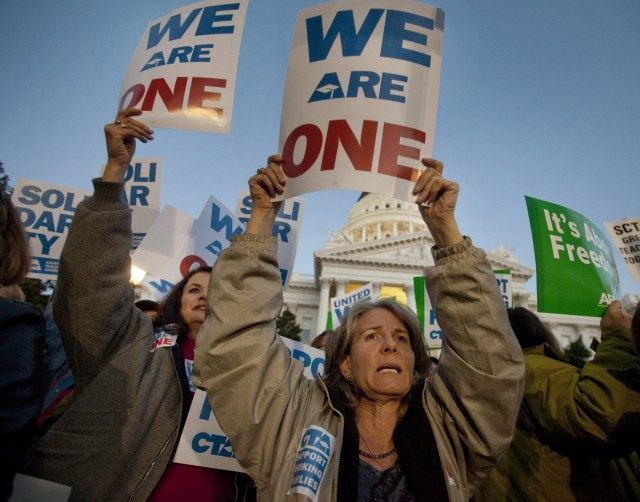Facing a coming Supreme Court decision that may permanently end all compulsory union dues collections in California, Sacramento Democrats are trying to slip in new rules that will require an ‘orientation’ on taxpayer-funded time for unions to confront employees about the wisdom of continuing to pay dues.
To understand the financial risk California unions face from the coming Supreme Court decision, Wisconsin passed a law four years ago that makes it illegal to require any mandatory union payments. Since then, the 70,000-member state employees’ union membership plummeted by 59,000; the American Federation of Teachers representing the college system saw membership drop from 22,000 to less than 10,000; and the 100,000 member National Education Association representing K-through-12 teachers lost 35,000 members.
The Supreme Court appeal that will be heard in the fall was started by Orange County elementary school teacher Rebecca Friedrichs, who claimed in Friedrichs v. California Teachers Association that “I’m not a member of the union, and I’m opposed to forced fees and forced unionism.” She sued because despite the lack of union membership, her bi-monthly paychecks are still docked to pay $650 a year for local union “agency fees” to compensate, supposedly, for the union’s collective bargaining services.
Those public sector employee fees typically constitute about 60 percent of the national average of $1,000 in annual union membership, and the money is mostly used to finance political spending.
As a demonstration of the partisan nature of agency fee spending in her home state, only 0.08 percent of the California Teachers Association’s political contributions between 2003 and 2012 went to Republicans.
The union did spent $60 million to defeat three ballot measures to eliminate automatic paycheck dues deductions, and funded millions in “political education” to force private employers to pay for health benefits and Obamacare.
Most teachers like Ms. Friedrichs have modest means. But the conservative Center for Individual Rights legal advocacy group funded her legal expenses in California federal district and appellate courts in an effort to take the case all the way to the U.S. Supreme Court for a definitive national decision.
Ms. Friedrichs’ world-class attorney Michael Carvin, former Deputy Assistant Attorney General for the U.S. Department of Justice in the Reagan Administration and a partner at the prestigious Washington, D.C. office of Jones Day, called the case “a challenge to the largest regime of state-compelled speech for public employees in the nation,” according to his appeal, filed at the high court in January.
The suit revisits the 1977 Supreme Court ruling in Abood v. Detroit Board of Education that upheld laws requiring all public sector employees that benefit from collective bargaining to pay so-called “fair-share” to local unions for those services, regardless if they choose to be union members or not.
Justice Samuel Alito recently wrote two majority opinions against unions’ coercive payments, and hinted that the high court seems ready to overturn forced “agency fees.”
Specifically, in 2012, Alito rebuked a California SEIU union local for mandatory collection of a special election-year fee from Dianne Knox and others workers objecting to making payment.
Last year, he stated in a 5-to-4 Supreme Court decision that the Illinois requirement that home health aides help cover a union’s cost of collective bargaining violates their First Amendment right to free speech. Justice Alito emphasized that it is a “bedrock principle” of the First Amendment that “no person in this country may be compelled to subsidize speech by a third party that he or she does not wish to support.”
Intrepid reporter Steve Greenhut of the San Diego Union-Tribune points out how important the Supreme Court decision will be, since “the state’s public-employee unions are among the most powerful interest groups” in Sacramento and they “fear a coming rollback in their financial power.”
Greenhut tracked how the Democrat controlled state legislature tried to use a “gut-and-amend” tactic quietly to pass a non-negotiable “public employee orientation.” The quality time for unions would mandate that all newly hired school employees and transit workers attend a program during working hours sponsored by their “recognized local union.” There is obvious concern that the “orientation” could be used to badger or humiliate new hires into signing up for automatic union fee deductions.
The League of California Cities and Association of California School Administrators have pushed back on the idea by sending a letter to legislators expressing concern: “If proponents of agency fees are allowed to urge public employees to pay them voluntarily, this provides an opportunity to anyone with opposing views to address those employees in the same manner.”

COMMENTS
Please let us know if you're having issues with commenting.